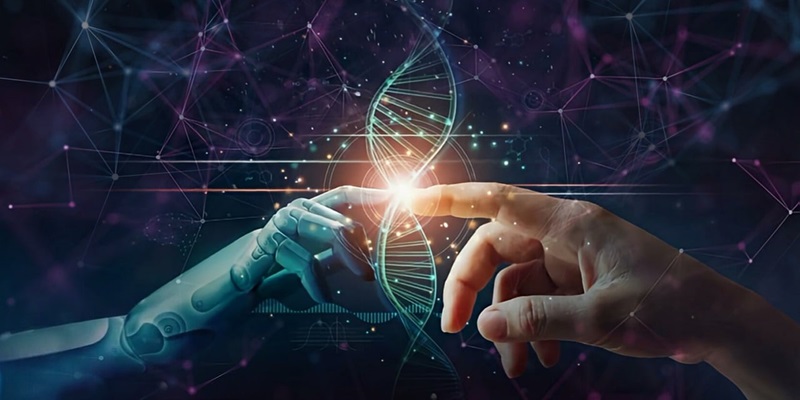Vibrational spectroscopy has long been recognized as a powerful tool for analyzing biological compounds and providing valuable insights into their structure and configuration. These techniques, such as near-infrared (NIR) and Raman spectroscopy, offer non-invasive and portable approaches to analyze a wide range of biological samples. However, analyzing large datasets and interpreting complex spectral information have posed challenges in fully harnessing the potential of vibrational spectroscopy.
The role of AI in vibrational spectroscopy
Artificial Intelligence (AI) has emerged as a game-changer in the field of vibrational spectroscopy, revolutionizing the analysis and interpretation of complex biological samples. By harnessing the power of AI algorithms, researchers are now able to enhance data analysis and visualization, enabling a clearer understanding of the chemical components present in biological samples. AI has proven to be invaluable in addressing the challenges of handling massive datasets generated by vibrational spectroscopy techniques.
Traditional Vibrational Spectroscopy Methods
Traditional vibrational spectroscopy methods have played a pivotal role in advancing the understanding of biological compounds. NIR and Raman spectroscopy, in particular, have provided valuable insights into the structure and configuration of various biomolecules. Moreover, these techniques offer the advantage of being non-invasive, allowing for rapid and sensitive analysis without altering the biological samples. This makes them ideal for a wide range of applications in fields such as pharmaceuticals, biotechnology, and environmental monitoring.
Portable Vibrational Spectroscopy Devices
The development of portable vibrational spectroscopy devices has further expanded the applicability of these techniques, enabling real-time evaluation of biological samples. These handheld devices have revolutionized fields such as forensics, where immediate on-site analysis is crucial. Additionally, portable devices have played a pivotal role in ensuring pharmaceutical quality control, food safety monitoring, and environmental analysis.
AI-driven machine learning methods
One of the most significant advancements in the integration of AI with vibrational spectroscopy is the application of machine learning methods. These data-driven approaches have allowed researchers to extract meaningful information from spectral readings. By employing AI algorithms, machine learning models can identify patterns and correlations within large datasets, leading to more accurate and informative results. This has significantly enhanced our understanding of complex biological systems and facilitated the identification of novel biomarkers.
Symposium on “Novel Vibrational Spectroscopy Empowered by Artificial Intelligence” at Pittcon 2024
To explore the recent advancements and challenges in the field, the prestigious event Pittcon 2024 will host the symposium “Novel Vibrational Spectroscopy Empowered by Artificial Intelligence.” This symposium will provide a platform for researchers to showcase their cutting-edge work and exchange ideas regarding the integration of AI in vibrational spectroscopy. Attendees will have the opportunity to gain insights into the latest advancements in vibrational spectroscopy and the potential implications for various scientific disciplines.
Keynote Speaker: Prof. Christian Huck
Among the distinguished speakers, Prof. Christian Huck will deliver a keynote address focusing on the combination of AI algorithms with NIR spectroscopy. Prof. Huck will showcase the diverse applications of this integration in bioanalytical analysis, agriculture, and environmental monitoring. His expertise will shed light on how AI-driven vibrational spectroscopy can revolutionize these fields, providing faster, more accurate, and high-throughput analysis techniques.
Symposium on “Artificial Intelligence Biosensors: Challenges and Prospects”
In addition to the “Novel Vibrational Spectroscopy Empowered by Artificial Intelligence” symposium, Pittcon 2024 will also host a symposium titled “Artificial Intelligence Biosensor: Challenges and Prospects.” This symposium will delve into how AI is bridging the gap between data acquisition and analysis in biosensors, enabling a more precise examination of patients’ health. The integration of AI with biosensing technologies holds immense promise in revolutionizing medical diagnostics and personalized healthcare.
Integration of AI with vibrational spectroscopy
The integration of AI with vibrational spectroscopy is transforming the field, offering several advantages over traditional methods. By leveraging AI algorithms, researchers can process large volumes of data quickly, identify subtle spectral variations, and extract relevant information for decision-making. This integration offers faster, more accurate, and high-throughput analysis techniques, improving research efficiency and enabling new applications in various scientific and everyday life domains.
Artificial Intelligence has emerged as a crucial tool in the field of vibrational spectroscopy, enabling researchers to overcome the challenges associated with analyzing large datasets and interpreting complex spectral information. The integration of AI algorithms with vibrational spectroscopy techniques has unlocked new opportunities in analyzing and understanding complex biological samples. The symposia at Pittcon 2024 will provide a platform for researchers to discuss the recent advancements, challenges, and prospects in this field, paving the way for new discoveries and breakthroughs that will impact various scientific disciplines and everyday life applications.

